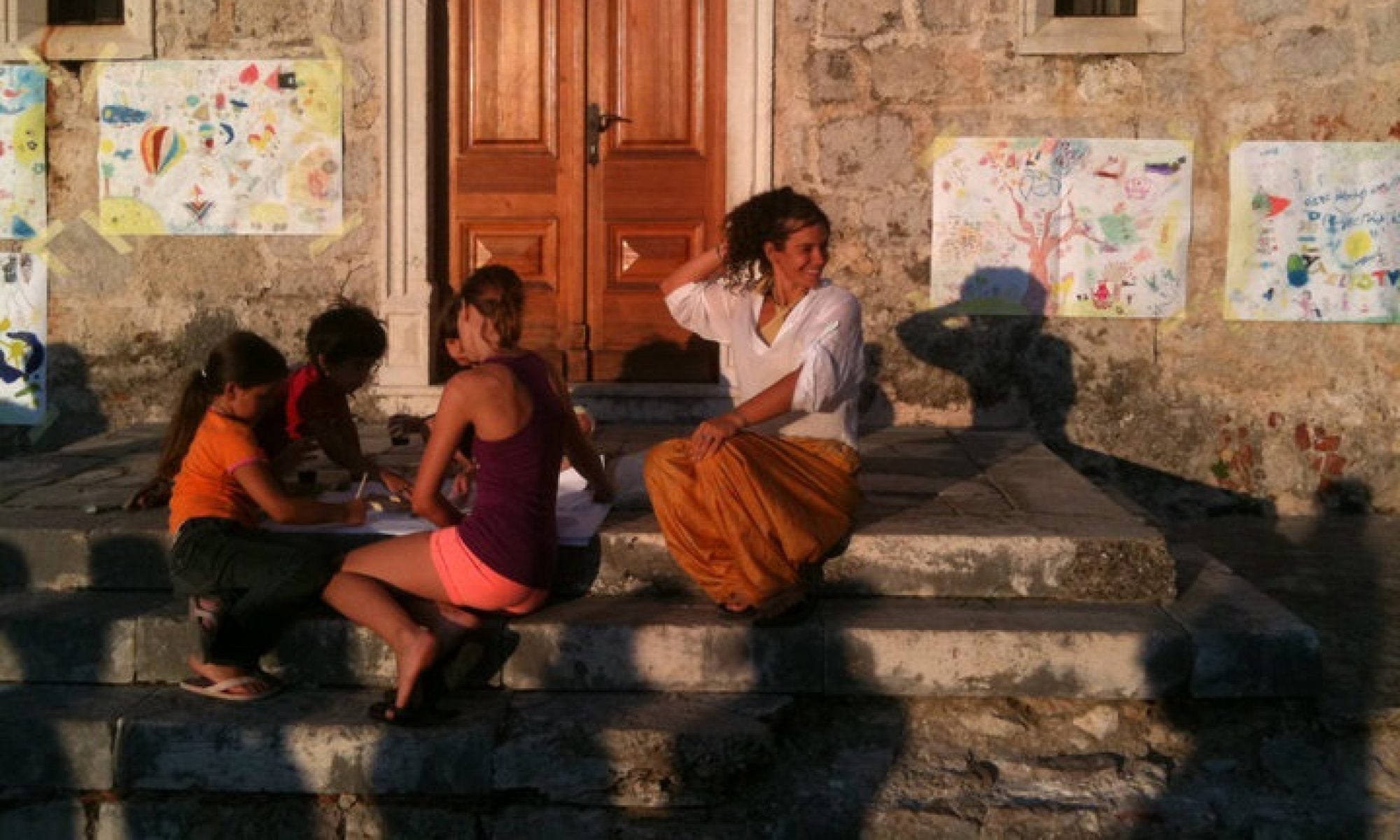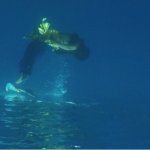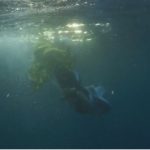Migrations 2018 was part of Open House Hvar , a community art project based in Croatia which I co-created and run with Ben Rattenbury from 2009 to 2019.
MIGRATIONS – GO HOME! (or ‘Migraination’ – invitation to conversation)
Migrations started on 16th July 2018 with the brilliant collaboration with Etno Festival Humac (and Djelem Djelem performance by Edina Husanovic and Sinisa Mitro) continuing with the visit from The Taste of Home (a social enterprise which employs refugees and records their memories of home and smells and tastes of their cuisine) and finishing with the residency of the artists’ collective ‘Scena’ from Tuzla (Bosnia and Herzegovina) who created artworks on the theme of migration. The peak of the event was in a packed exhibition in Stari Grad on 1st August 2018.
During the Migrations exhibition in Stari Grad on 1st August we put out a map of the world, encouraging the participants to trace the line of their own migration, the places they came from, the places where they would like to go. Children and people came, traced their pathways on the map in many charming and colourful ways. When the event ended we decided to keep the map on the wall of the side street in Stari Grad, seeing if we would get any further contributions from the passers-by. Sure enough, the next morning there was some new words in red saying ‘MIGRATIONS – GO HOME’.
The depressing predictability of this sentiment, written in the dark, during the night, is combined with the absurdity of it. Migrations – go home? Where are the migrations to go? What is the home of migrations? We have had migrations from the beginning of time, presumably, so where is their home?
During Open House 2018: Migrations, we found out that we have an ability and opportunity to provide a safe place, and momentary relief to activists who work with migrants, who are exhausted from the daily fight of finding money, protecting others, advocating basic human rights, in the climate of fear, prejudice and sometimes, violence. We also have a tradition of providing refuge in a beautiful and peaceful environment for those who need a break from whatever life situation they have. We forge imaginary communities, in solidarity with many others, that work to fight prejudice and the politics of fear in various corners of Europe.
The headache and heartache of the contrast between the desperation, death, loss, and destitution of people coming to Europe since the 2014 refugee crisis, and our enchanted existence on the beautiful Hvar, was the wellspring for creating Open House Hvar 2018: Migrations.
The headache over the difficult questions about immigration, desperately sad media reports of the overturned boats and the violence against immigrants in Europe, and our role in this, led us to find a way in which art activities during Open House in Vrisnik could join many inspirational projects that offer hope of bridging the gap between ‘us’ and ‘them’, and meeting ‘migrants’ as humans.
We returned to the urgent question: How are we as artists and human beings re-writing the script of the Immigrant as the threatening ‘Other’? One way of tackling this is questioning the language around migration. Acknowledging migrants as subjects with their own unique stories, as subjects rather than objects, and recognising that we are all migrants with our own unique stories of migration and home, was our starting point. In my performances and research work I explore my subjective experiences of migration, my past refugee experiences, and my current experiences as a nomad, a person who lives in many places, engaging in wider cultural politics. In the opening dance performance Djelem Djelem I offered many immigrant identities in a video projection: Migrant, Nomad, Criminal, Unaccompanied Child, Asylum Seeker, Traveller, Expatriate, Foreign Student, asking: ‘Who am I?’ and ‘Who are you?
In an earlier event at our Vrisnik home, during the visit of the ‘Taste of Home’, we asked people to write about what home means to them. We got many responses:
‘For me home means the place where I feel secure and loved. It is a place where I can be true to myself, it is a place where I can learn and grow in life. It is filled with dear people, with whom I can share hugs, cries, laughter and joy. Home is a spectrum of all colours and different dances. How I feel is how I am at home.’
‘Home is a safe place inside or outside me that supports me in who I am, in being free and creative. Home is where I can relax.’
‘THE PLACE WHERE I WANNA BE.’
‘Where my family is.’
‘A place where you always like to come and where you never like to leave.’
People who leave their homes and put their children on boats to try to reach Europe are doing so because the land for them has become less safe than the water that they entrust their children to. Their idea of home would not be very different than what was written during the Taste of Home visit in our house. For most of us, home is a past concept that doesn’t exist any more, even for those of us whose homes weren’t destroyed by wars. So when we say Migrations, Go Home – it means literally going to the impossible past.
I would like to offer another possibility of finding an imaginary home. Open House has taught me that when ordinary things (such as cooking, cleaning, building etc) converge with extra-ordinary things, such as performance, music, dance, art, limitless possibilities of the collective imagination can be opened up. The Open House events evoke Communitas, a spirit of community, where people participate on an equal footing, and experience liminality through collaborative creative activities. There are moments or, days, or nights, that stretch, with incredible beauty, and envelop participants into a shared space of play. These moments evoke for me, an idea of a safe space to dream, rest, create, ‘to feel secure and loved’, or to be ‘at home’.
During Open House 2018: Migrations, we found out that we have an ability and opportunity to provide a safe place, and momentary relief to activists who work with migrants, who are exhausted from the daily fight of finding money, protecting others, advocating basic human rights, in the climate of fear, prejudice and sometimes, violence. We also have a tradition of providing refuge in a beautiful and peaceful environment for those who need a break from whatever life situation they have. We forge imaginary communities, in solidarity with many others, that work to fight prejudice and the politics of fear in various corners of Europe.


